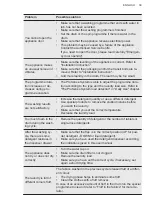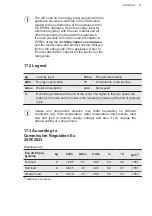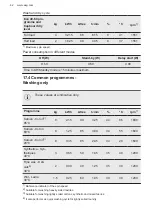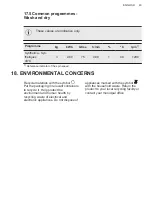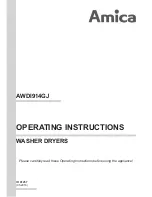
14.2 Stubborn stains
For some stains, water and detergent is
not sufficient.
We recommend that you pre-treat these
stains before you put the items in the
appliance.
Special stain removers are available.
Use the special stain remover that is
applicable to the type of stain and fabric.
Do not spray stain remover on garments
near the appliance as it is corrosive to
the plastic parts.
14.3 Detergent type and
quantity
The choice of detergent and use of
correct quantities not only affects your
wash performance, but also helps to
avoid waste and protect the environment:
• Use only detergents and other
treatments specially made for
washing machines. First, follow these
generic rules:
– powder detergents (also tablets
and single-dose detergents) for all
types of fabric, excluding delicate.
Prefer powder detergents
containing bleach for whites and
laundry sanitization,
– liquid detergents (also single-dose
detergents) , preferably for low
temperature wash programmes
(60 °C max) for all types of fabric,
or special ones for woollens only.
• The choice and quantity of detergent
will depend on: type of fabric
(delicates, woollens, cottons, etc), the
colour of clothes, size of the load,
degree of soiling, wash temperature
and hardness of the water used.
• Follow the instructions that you find
on packaging of the detergents or
other treatments without exceeding
the indicated maximum level (
).
• Do not mix different types of
detergents.
• Use less detergent if:
– you are washing a small load,
– the laundry is lightly soiled,
– there is large amounts of foam
during washing.
• When using detergent tabs or pods,
always put them inside the drum, not
in the detergent dispenser and follow
the manufacturer's
recommendations .
Insufficient detergent may cause:
• unsatisfactory washing results,
• the wash load to turn grey,
• greasy clothes,
• mould in the appliance.
Excessive detergent may cause:
• sudsing,
• reduced washing effect,
• inadequate rinsing,
• a greater impact for the environment.
14.4 Ecological hints
To save water, energy and to help
protect the environment, we recommend
that you follow these tips:
•
Normally soiled laundry
may be
washed
without prewash
in order to
save detergent, water and time (the
environment is protected too!).
• Loading the appliance to the
maximum capacity indicated for
each programmes helps to reduce
energy and water consumption
.
• With adequate pre-treatment, stains
and limited soiling can be removed;
the laundry can then be washed at a
lower temperature.
• To use the correct quantity of
detergent, refer to the quantity
suggested by the detergent producer
www.aeg.com
30
























